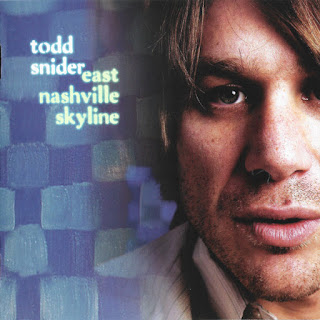In a city filled to the brim with musical talent,
Tommy Womack often gets overlooked. I first met Womack two decades ago when he was the frontman for late ‘80s cult band Govt. Cheese, a unique hard-rocking outfit that came roaring out of Bowling Green, Kentucky like the ghost of Hank Williams riding astride a Nipponese superbike with flaming tailpipes! The band’s momentary flirtation with stardom inspired Womack’s tale of rock ‘n’ roll woe,
The Cheese Chronicles, the best book about life on the road ever written (sorry Jack Kerouac!)
After the demise of Govt. Cheese, Womack immigrated to Nashville to pursue his musical career in earnest. Womack landed a gig as one-third of the Bis-Quits, a groovy little band that included the talented Will Kimbrough and future music retail exec Mike “Grimey” Grimes, the collaboration yielding one great roots-rock album on John Prine’s Oh Boy record label. Womack would then launch his solo career, almost a decade ago, with the brilliant debut album Positively Na Na in 1998.
The life of an indie rocker is a tough one, though, especially when, like Tommy Womack, your main attribute is that you don’t fit in. Womack has always been too country, too rock ‘n’ roll, too serious, not serious enough, too wordy, too stubborn, getting older…just not marketable by today’s “standards.” Never mind that he’s always made brilliant, entertaining music with highly personal lyrics that nevertheless appeal to many people that recognize the characters in the songs from the same streets we all walk together, if separately.
Tommy Womack’s There I Said It!
After 2002’s Circus Town, shortly after his fortieth birthday, Womack hit rock bottom. As he writes in the liner notes to There I Said It!, “one morning in March ’03, God came across my teeth with a skillet of White Light Truth. Whomp! I was toast at forty and destined to die poor.” Womack had a meltdown, of sorts, the sort of life-paralyzing crisis-of-confidence that drops the strongest of men to their knees and into spirals of mind-crippling depression. Months passed by and those close to Womack began to worry; more than one “friend-of-a-friend” got in contact and asked me to talk to Tommy. We swapped emails back and forth, even talked on the phone once or twice, but I doubt that my words of encouragement did little more than add to the chorus of friends and admirers urging Tommy to “feel better.”
Truth is, the personal hell that Womack was going through was something that few people will ever experience. He thought he saw his career circling the drain, his future uncertain, a divine voice saying, as he writes, “you had yer shot, thanks a lot,” leaving him older and broke with a family to support and the kind of dreams that tear one apart. Over the following three years, Womack recovered somewhat, got a crappy job like most of us, hating it like most of us and still, always, playing music. It was the music that, in the end, pulled him through, lending a voice to his fears and emboldening him to carry on.
The result of Womack’s trials and tribulations is There, I Said It!, his fourth studio and fifth album overall, a mind-staggeringly brilliant collection of songs that literally open a window to the artist’s soul. In many ways There, I Said It! reminds me of Joe Grushecky’s equally powerful 2004 album True Companion. At the same time that Womack was living through his crisis, Grushecky was looking into his own abyss. Over fifty, overshadowed by the accomplishments of his peers, Grushecky came to the conclusion that he may never make it big in rock ‘n’ roll but, “I still got a long way to go.”
This is Tommy Womack’s story, however, and There, I Said It! is his masterpiece. The songs here recount the last several years of his life, biographical tales with great humor and insight and a little sadness. “A Songwriter’s Prayer” is a brilliant lead-off, a somber ode from a wordsmith to a higher power asking for just one good song, something to hang your hat on and build a career around. Delivered with pious vocals, mournful pedal steel and a haunting melody, the song is both tongue-in-cheek and deadly serious, with “we got to get out of this place” urgency.

I’m Never Gonna Be A Rock Star
Written about his son Nathan, “Nice Day” takes a look at life from the high side of 40, a winsome kind of tune that concludes, at the end of the day, that life is good when you have your family around you. The country-flavored “25 Years Ago” is a semi-biographical honky-tonk tale of the search for stardom by three hopefuls, spiced up with twangy steel and Womack’s upbeat vocals, the story of everybody that has ever come to Nashville (or LA or New York) chasing a dream.
“I’m Never Gonna Be A Rock Star,” from which There I Said It! takes its title, is a lilting, jazzy tune with Womack’s soulful, fluid vocals and muted yet lush instrumentation. The song’s reflective self-confession is both cathartic and one last shot at those who would try and bring the artist down. “My hair may go, but the dream remains,” the protagonist sings, getting older every day while his musician friends have forged moderate careers of one form or another, “buddies on tour buses, takin’ that ride, while I’m gettin’ older with an itch inside.” This reflective song parallels Joe Grushecky’s “Strange Days,” a realization that while every artistic effort through the years may not have been for naught, the lack of recognition – if not fame and fortune – is a bitter pill nonetheless.
The bluesy “Too Much Month At the End Of The Xanax” is a bleak reflection on modern life, its otherworldly, electronically-altered vocals punching their way through a cloud of tortured electric guitars and discordant rhythms. It’s a style that Womack has always excelled at, self-referential talking blues paired with a hard rocking soundtrack that could just as easily been a Govt. Cheese song if it wasn’t so damn personal. By the time you reach “I Couldn’t Care Less,” a rollicking pop-rock rave-up inspired by the tired 9 to 5 that Womack endured during his “blue period,” things are starting to look up. Gigs are coming his way, and Womack delivers a lyrical coup de grace with more attitude and bile than any punk band I’ve been witness too, allaying his friend’s fears with “I feel alright, suicide is overrated, I’ve killed and lied, or at least I’ve mutilated.”
The centerpieces of There I Said It! are the epic stream-of-consciousness masterpiece “Alpha Male & the Canine Mystery Blood” and “A Cockroach After The Bomb.” Both songs evince the sense of humor that has always driven Womack’s best material, but they are also both songs that pack up the past in a box and put it on the shelf, saying goodbye to a time that none of us will ever again enjoy, much less revisit except in memory. “Alpha Male” is a wonderful recollection of a misspent youth and encroaching middle age that many of us can relate to (especially those of us whose age and experience parallels Womack’s). He sees a band poster while walking to work, bringing back memories of the day 20+ years ago when all of us would run out to see a show by any band that sounded even half-intriguing, a poster on a telephone pole an invite to a night of beer, women, and rock ‘n’ roll. Tying the past to the present and facing his own growing obsolescence, Womack admits that “can’t be a has-been when you never was.”
A Cockroach After the Bomb
“A Cockroach After the Bomb,” a semi-shuffle with lively vocals and spry piano work courtesy of producer John Deaderick, is the yin to the yang of “Alpha Male.” The song begins by expressing an angst that no 20-something-year-old young pup could ever understand, confessing, “I get up every morning and I go to a job where I’ve thrown up on the john. I worry about who’s mad at me and spend a lot of time wishing I was gone.” He remembers his previous life, in a gang with a band, “I used to be somebody, I was a star, it takes a lot of guts to fall this far,” concluding that “I’m a cockroach after the bomb, carrying on…”
It’s with this refrain, however, that Womack touches the album’s truth, that in spite of the darkness, those that feel the muse are compelled to follow, to “carry on” no matter the price, and as Steve Forbert once sang, “you can not win if you do not play the game.” The singer asks, “what if Jimi’s lighter hadn’t lighted, what if Monet was just near-sighted, I’ll go to my grave knowing I took me a chance, I’m a cockroach after the bomb carryin’ on.” The song is a call to arms for all of us last-crop-baby-boomers stuck in a cubicle or middle management with a mortgage and obligations who still harbor delusions of creativity that our parents warned us against pursuing. It’s fitting that the album’s next-to-last song is “Everything’s Coming Up Roses Again;” Womack writing in the liner notes that “this record started with a prayer and ends with its answer.”
The song’s waltz-like demeanor and wistful vocals belie its message – that as long as you’re breathing, you can still follow your dreams. “I may be a 44-year-old office boy,” writes Womack, “but I’m the office boy that did Leno!” You’re never too old to sing that song, write that story, paint that picture, and thus sayeth Springsteen, “throw away the dreams that break your heart.” You’ve got one life to live, and as
There Is Said It! slides to a close with the wiry, guitar-driven instrumental “Nice Day (reprise),” you get the sense that Womack, like Grushecky at the end of
True Companion, has found some degree of peace in family, friends and, of course, his music.
In a city filled to the brim with musical talent, Tommy Womack has often been overlooked. Age and experience has broadened his lyrical palette, however, the songs on There, I Said It! among the best he’s ever written. A skilled songwriter and charismatic performer, Womack peppers his songs with musical scraps of roots-rock, Americana, blues, and hard-rock. Ironically, initial acclaim for this album, and the positive response afforded it by nearly everybody that has heard it, could end up reviving a career that Womack thought was on life support. By any measure,
There, I Said It! is the work of an artist yet to hit his peak, an emotionally moving song-cycle that defies the industry gatekeepers and rocks with élan, guts, and intelligence. (Cedar Creek Music, released 2006)
Review originally published by the Trademark of Quality (TMQ) blog…



























